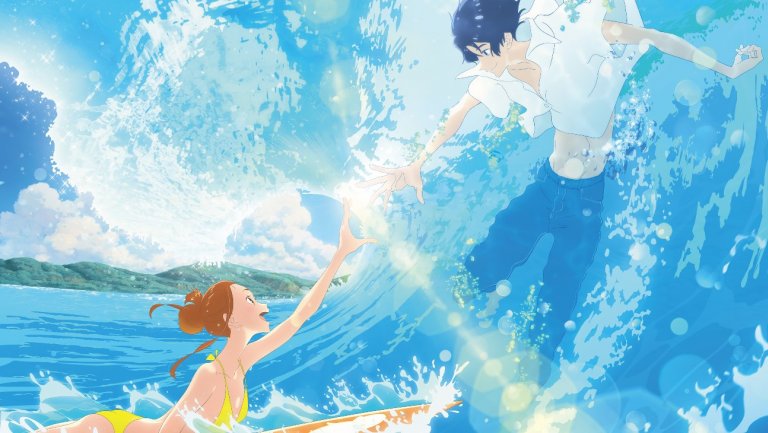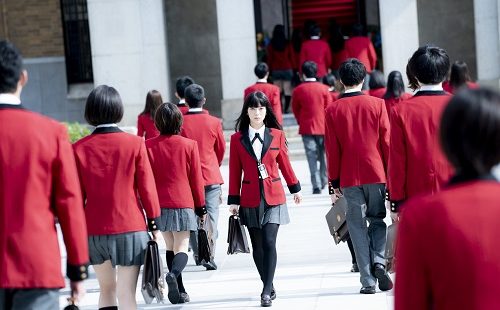Japan Foundation Film Tour 2020
December 18, 2019 · 0 comments
By Jasper Sharp.
 In customary fashion for the time of year, the Japan Foundation has just announced the programme for its annual touring film season to give us something to look forward to in these dark and joyless winter months. With 20 titles heading to 22 venues across England, Scotland, Wales and Northern Ireland between 31st January and 29th March, the season continues its year-on-year trend of bringing more films to more people.
In customary fashion for the time of year, the Japan Foundation has just announced the programme for its annual touring film season to give us something to look forward to in these dark and joyless winter months. With 20 titles heading to 22 venues across England, Scotland, Wales and Northern Ireland between 31st January and 29th March, the season continues its year-on-year trend of bringing more films to more people.
The 17th edition of “UK’s largest festival of Japanese cinema” promises a welcome light at the end of the tunnel for SAD-suffering Japanophiles, providing an opportunity for big-screen bingeing on the type of films that seldom get screened elsewhere over here. The theme this time round, ‘Happiness is A State of Mind’, might be as catch-all as ever (“the search for happiness has long provided Japanese cinema with a staple theme”, apparently), but of course Japan has just cause for optimism in 2020, as all eyes fall upon the country in its Olympic year.
The sole animated offering in this year’s programme is Ride Your Wave (2019), directed by Masaaki Yuasa, the eclectic talent behind Mind Game (2004), The Tatami Galaxy (2010) and Lu over the Wall (2017), amongst others. This sunny romantic fantasy, set in a small Japanese harbour town, features a burgeoning love affair between a keen young surfer Hinako and her firefighter boyfriend Minato that manages to endure past the latter’s watery demise. Having already premiered at Scotland Loves Anime in October 2019 (where it won the Golden Partridge), I don’t think it would be giving too much away to reveal that, thanks to Anime Ltd, there will be many more opportunities to catch up with Yuasa’s latest for those who can’t make these touring screenings.
 Kakegurui – Compulsive Gambler (2019), set amongst the students of a private academy where academic ability is of trifling importance compared to one’s skill at the roulette wheel, is a live-action film, not animated, although its pedigree can be traced back to its origins as a manga serial, first published in 2014, with both live-action and animated television series following. The director of this first theatrical outing, Tsutomu Hanabusa, caused something of a stir ten years back with his debut Handsome Suit (2008), about a socially maladroit restauranteur who finds his luck with the ladies transformed by the titular item of clothing. This led to bigger things including helming Sadako 3D (2012) and its 2013 sequel, two of the apparently interminable attempts at reviving the ghostly star of the Ring horror series. Kakegurui looks set to build on the promise of these earlier works in delivering a mix of high-concept satire while bolstering the reputation of a successful franchise already established in other media.
Kakegurui – Compulsive Gambler (2019), set amongst the students of a private academy where academic ability is of trifling importance compared to one’s skill at the roulette wheel, is a live-action film, not animated, although its pedigree can be traced back to its origins as a manga serial, first published in 2014, with both live-action and animated television series following. The director of this first theatrical outing, Tsutomu Hanabusa, caused something of a stir ten years back with his debut Handsome Suit (2008), about a socially maladroit restauranteur who finds his luck with the ladies transformed by the titular item of clothing. This led to bigger things including helming Sadako 3D (2012) and its 2013 sequel, two of the apparently interminable attempts at reviving the ghostly star of the Ring horror series. Kakegurui looks set to build on the promise of these earlier works in delivering a mix of high-concept satire while bolstering the reputation of a successful franchise already established in other media.
It seems fitting that an overlooked work from Kon Ichikawa be included as the token older classic title to be resurrected for the 2020 line up. This was the man entrusted with helming the epic critically-praised documentary account of the 1964 Summer Olympics, Tokyo Olympiad (1965). Nevertheless, if works such as the multi-camera/multi-screen Japan and Japanese (1970) exhibited in the Japanese Pavilion at the Osako Expo 70 have seen Ichikawa framed as something of an establishment figure, and his internationally best-known films like Harp of Burma (1956), An Actor’s Revenge (1963) and The Makioka Sisters (1983) have imbued him with an international reputation for highbrow arthouse dramas and literary adaptations, it should be remembered that the director was originally celebrated in Japan for his satirical swipes at daily life in the rapidly modernising environment of the immediate post-war era. Ten Dark Women (1961) is definitely the pick of the season in my book, with its tale of a philandering TV producer getting his comeuppance at the hands of the women he has treated as his playthings.
If Ichikawa’s film doesn’t seem to promise a happy ending for at least one of its characters, then it is worth drawing attention to the season’s subtitle of ‘Joy and Despair in Japanese Cinema’. The synopsis of Her Sketchbook (2017) suggests both despondency and elation, with the move from darkness to light signalled by the literal translation of its title as “The World is Yours from Today”. This winsome celebration of the regenerative powers of contemporary pop culture follows a young woman’s emergence from her reclusive life as a hikikomori, having barely engaged with the outside world over the past five years beyond reading manga and honing her own artistic skills – skills which do not last long unnoticed when her father encourages her to take a job as a bug-tester at a computer games company.
 My Love Story!! provides a prime example of a film drawn from the self-contained but exaggerated worlds conjured up on the manga page. It is a high-school rom-com following the standard Cinderella narrative arc, except for the interesting twist that the character in search of love is not your usual shrinking violet but an ungainly hulking bonehead who, while not exactly unpopular with the ladies, is not exactly most young girls’ dream of a knight in shining armour.
My Love Story!! provides a prime example of a film drawn from the self-contained but exaggerated worlds conjured up on the manga page. It is a high-school rom-com following the standard Cinderella narrative arc, except for the interesting twist that the character in search of love is not your usual shrinking violet but an ungainly hulking bonehead who, while not exactly unpopular with the ladies, is not exactly most young girls’ dream of a knight in shining armour.
Romantic love presides over a large part of the programme, in titles like Our Meal for Tomorrow (2017) and Little Nights, Little Love (2019). The season’s opening film, And Your Bird Can Sing (2018), directed by Sho Miyake, is a slacker drama about a trio of carefree young twenty-somethings living in the northerly port city of Hakodate in Hokkaido, among whom is our bookstore clerk narrator-protagonist who is so laid back, it seems he might be missing out on a good thing when he skips a date with his co-worker to spend his evening with his flatmate drinking into the small hours.
In The Actor (2015), directed by Satoko Yokoyama, one of the leading lights of the new wave of women directors who emerged in Japan in the first decade of the millennium, a bit-part supporting actor facing his forties finally looks like he might get his chance for a leading role in someone else’s life. Underscoring the message that love is just not a fleeting yet life-changing encounter between beautiful young things is the bold inclusion of I Go Gaga, My Dear (2018), Naoko Nobutomo’s intimate documentary of her 90-something parents as her mother succumbs to Alzheimer’s.
And this is but a small part on what’s on offer. In summary, “Happiness is A State of Mind” is wide and inclusive enough a programme to give everyone cause to smile.
The Japan Foundation’s tour is appearing at numerous venues around the UK between January and March 2020. See the website for details.
Leave a Reply